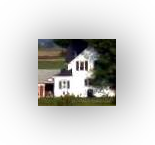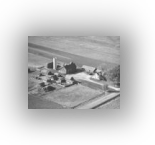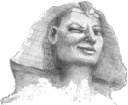Memories of the Knuth Family by its author
Things that I remember about the William Knuth Family and growing up on the rural family farm
I was born in 1947 having the good fortune of being born into the household of William Knuth, known to me as grandpa, but as Bill Knuth to his friends. His given name, in German, was Wilhelm Fredrick Knuth.
My parents were John and Emogene, and again it is my good fortune that my dad was the youngest of William's children. John was the last to pass away of Williams children. Dad's time on the farm has given me the passion for this family history and the area in which I grew up. I had my full youth and adolescence on the farm and the recollections are mostly wonderful.
The Knuth farm fed and raised all of William and Albertine's children but they had left to live their lives by the time I arrived. I never knew grandma Knuth, Albertine, she died in 1942. You can see the obituaries on the gravestone page.
Grandpa remained on the farm until two years before his death in 1955. I was 8 years old but I was old enough to remember things about him, the family and its history in Augusta Wisconsin.
I loved Grandpa dearly and he was precious to me. Grandpa had strong faith. I recall being joyous at his funeral because he taught me he would be with God. The funeral was on a vivid sunny and beautiful October day. I was loud and boisterous at the funeral home, surely making too much noise as I played outside with the Knuth cousins. I recall grandpa's daughters, probably Margaret and Esther, not being pleased - they yelled at us and made sure we hushed up, calmed down and understood that other family members were grieving our grandpa's loss.
I know and vaguely remember some of the trials and tribulations in my early years in the Knuth family. Dad and Mom inherited the farm from Grandpa but the farm was his estate. Dad and Mom got the farm and its title, but the estate had to be paid off. My parents mortgaged the farm to fulfill the obligations. I've learned in my later years that families are always stressed about inheritances and the William Knuth Family was no different. Some of William Knuths children received cash and willed possessions. Some of William and Albertine's children receive almost nothing.
William was of German stock; the attitude of his generation was that children must be what their parents were or wanted. Grandpa expected and even demanded that his male children be farmers and his female kids be farmers' wives. His generation believed it a deep insult to them as parents for their children to not follow in their path. William's attitude dictated that some non-farmer children receive one dollar in his will while other got more.
My dad, John, inherited and shared William's old fashioned attitude - see notes. I had little interest in farming as I matured and it was a disappointment for dad. Some of William's children were interested in education but some went no further than grade school. I wanted to graduate from college but dad believed advanced education as wasteful expense and refused to help with the costs.
The Knuth family dairy farm managed to eventually prosper again after William's death but there were tough times while the estate was being paid off. I recall an argument between my parents when bills were due. An option to pay the bill was to sell a cutter, aka a one horse open sleigh - see notes below. The sled was apparently valued as precious by my mother, Emogene, perhaps as an heirloom. Dad viewed it as a totally useless piece of equipment on a 1950's dairy farm. Dad won the argument and for some reason I specifically remember the cutter being sold for $30. It must have been a big argument for me to remember it almost 60 years later.
Pets and farm animals
Animals of many types were always around. I remember pets bought for me by grandpa Bill. They included my dogs Skippy, the house terrier and Rover, our working collie; a pet lamb and a pet goose. I sometimes slept with grandpa and Skippy was right there in the bed with us.
Rover would mind the family dairy herd. The cows might be over the hills and out of sight at milking time; on grandpa's command Rover would get the entire herd of cows and bring them back to the milking barn.
Rover was much more than that; he was my best friend and he tended me, too. One of my earliest memories is Rover vigorously pulling on my clothes, pulling me back to the farm yard when I tried to stray to a field's hill that was 300 yards away - there was a rainbow there and I wanted to get the pot of gold; Rover would not let me go.
The barn always had a haymow stacked high to the rafters. I remember climbing up and wanting to peer down from the rafters. Somehow Rover got up there too. He planted himself in front of me barking loudly and not letting me get close to the dangerous edge. His barks alerted grandpa to rescue me. You can see a picture of Rover with hired hand Axel here.
Grandpa and mom and dad decide that my pet lamb was getting to0 large for us to care for. He insisted it was time for it to go and that it had to be sold at a livestock auction. I vigorously and tearfully objected as we was loaded my pet onto the truck; grandpa deposited the cash from the sale into my first savings account.
The farm was a working farm. Animals where used to feed the family, power machinery and sold to raise cash; so there were gruesome tasks. Grandpa home butchered pigs and chickens for food. Grandpa inflated the leftover bladders of pigs as toys, they became balls like beach balls. see notes.
Other fond memories from my life on the William Knuth family farm
Grandpa and I used to listen to radio dramas together, our favorites being The Lone Ranger, and Roy Rogers. Grandpa would cross his legs at the knee and I would ride and bounce astride his angles as though I was on a horse as he sang hi deedle hi ho. The radio sound of the clopping hooves and sweet fragrance of his pipe tobacco is still with me.
I remember picking wild strawberries in road side ditches and in fallow fields (no cultivated strawberries have such sweet taste). It was something that I looked forward to every summer
Swimming, bamboo cane pole fishing, skating, and ice fishing on the Dells Mill pond. Grandpa and I used to take horse drawn wagon loads of grain or corn to be ground at the Dells Mill. While the work was being done, we fished for sun fish out the mill's window.
I remember Christmas programs at the rural Dells Mill school, sledding with other kids, getting stuck in a snow bank and having grandpa rescue me.
My affection for grandpa Bill created my passion for the family, Augusta Wisconsin, and the Dells Mill. It has led me to create and keep up this Knuth.name site and DellsMill.com, AugustaWi.com and BeanAndBaconDays. There are more recollections of the 1950's era on the Augusta Wi site if you are interested. "Remembering a 1956 Centennial Year, History of Augusta Wisconsin". AKA, "What life was like in 1956"
Cutters are horse drawn wintertime sleds for leisurely driving usually with room for just one or two couples. Cutters were typically ornate with hand carved and painted decoration and metal work. Sleighs are larger, designed toward the functional, allowing room for families. The Henning Art Gallery and Sleigh Museum in Augusta features a collection of cutters
Education was not considered a high priority during William Knuth's time. My Dad, John, only had an 8th Grade education. Male farm children were expected to significantly contribute to the physical demands of farming to support the large families. After grade school these young men were expected to WORK full time on the farm
The first footballs were made from pig bladders.
More Rememberances of Growing up near the Dells Mill Pond in Augusta Wiscosnin on the CoisaCoisa Photo and Video Log of Life. Coisa Coisa Information about people and places


